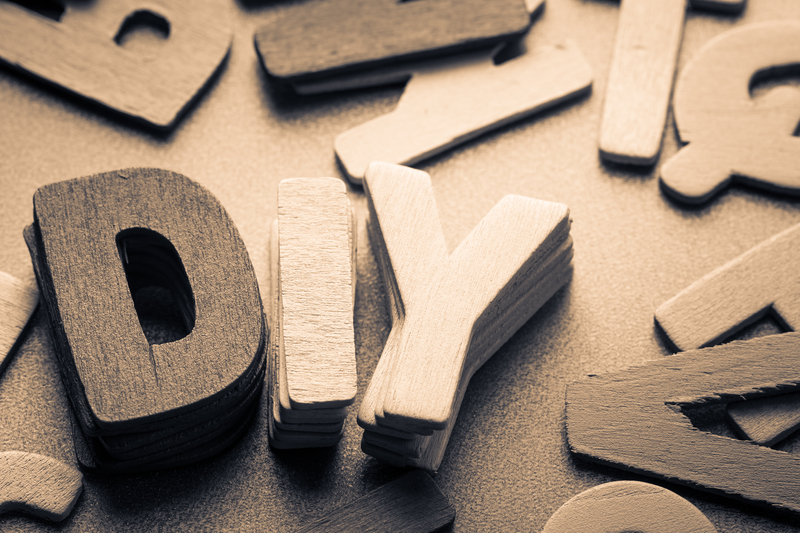Transform Chaos into Calm: The Stress Relief of De-cluttering
Introduction: From Overwhelmed to Organized
In today's fast-paced world, many of us struggle to find tranquility amidst clutter and chaos at home or in the workplace. But what if the path to a calmer, more peaceful life begins with something as simple as organizing your surroundings? De-cluttering is not just about tidying up--it's about transforming your mental space, reducing anxiety, and regaining control. In this comprehensive guide, we'll explore how de-cluttering your environment can bring stress relief and introduce lasting calm into your life.

Why Does Clutter Cause Stress?
According to psychological research, excessive clutter and disorganization can overwhelm our minds, making it hard to focus and exacerbating feelings of anxiety. Clutter continuously triggers our senses, and our brains interpret the mess as unfinished work. Over time, this sensory overload can lead to increased stress levels, reduced productivity, and even emotional exhaustion.
- Visual Chaos: Our surroundings affect our mood and ability to concentrate. A messy room or office can make it difficult to relax or find what you need.
- Decision Fatigue: Clutter often means more choices, which can lead to indecision and mental fatigue.
- Guilt and Frustration: Piles of unused items or forgotten projects can remind us of neglected responsibilities, resulting in ongoing guilt and frustration.
How De-cluttering Can Relieve Stress
Decluttering is more than just cleaning up--it's an act of self-care. The process of sorting, donating, or disposing of unnecessary items can provide immediate stress relief. Here's how:
- Boosts Clarity and Focus: A tidy space clears your mind, making it easier to concentrate and make decisions.
- Creates a Sense of Accomplishment: Successfully organizing your space gives you a tangible achievement to celebrate.
- Invites Calmness and Positivity: Minimal, organized environments promote relaxation and happiness.
- Reduces Anxiety: Letting go of excess possessions can be liberating, lightening your emotional load.
Psychological Benefits of a Clutter-Free Space
Numerous studies support the connection between an organized environment and improved mental well-being. Researchers have found that people living in de-cluttered homes experience less stress, better sleep, and higher overall satisfaction. Here are a few psychological advantages you can expect by letting go of clutter.
- Lower Cortisol Levels: Chronic clutter has been linked to elevated cortisol, a stress hormone. A clean space helps reduce this.
- Enhanced Creativity: A tidy environment allows your mind the space it needs to generate innovative ideas.
- Improved Mood: Organization helps reduce negative emotions and fosters feelings of control and contentment.
- Stronger Self-Esteem: Successfully organizing your life can give a much-needed confidence boost.
De-cluttering for Long-Term Stress Management
Many people assume that de-cluttering is a one-time task, but making it a regular practice leads to sustained benefits. Here's why maintaining an organized environment is vital for long-term stress relief:
- Prevents the Return of Chaos: Small, regular organizing sessions keep clutter at bay, reducing daily stress triggers.
- Promotes Healthy Habits: An orderly home can inspire other positive routines, like meal planning or regular exercise.
- Saves Time and Energy: No more wasting precious minutes searching for lost items--everything has a place.
Step-by-Step Guide to De-cluttering
Ready to transform your chaotic surroundings into a haven of calm? Here's a step-by-step guide to harnessing the stress relief benefits of de-cluttering:
1. Make a Commitment
Set aside dedicated time for your de-cluttering project. Treat this time as an important appointment with yourself.
2. Start Small
Begin with a manageable area--such as a single drawer or shelf. Early success will boost your motivation for bigger projects.
3. Sort Items Methodically
- Keep: Items you use frequently or bring you joy.
- Donate: Useful items that you no longer need.
- Recycle/Dispose: Broken, outdated, or expired possessions.
4. Be Ruthless, But Compassionate
It's important to be honest about what you truly need. If something no longer serves a purpose or brings happiness, it's time to let it go. However, recognize that some possessions may have sentimental value--give yourself grace for these emotional decisions.
5. Organize What Remains
- Find a "Home" For Everything: Ensure each remaining item has a dedicated spot to maintain order.
- Use Storage Wisely: Baskets, bins, and labels aren't just for looks--they make staying organized much easier.
6. Maintain a Clutter-Free Lifestyle
- One In, One Out: For every new item you bring in, commit to removing another.
- Daily Tidy-Up: Spend ten minutes at the end of each day putting things away.
De-cluttering Tips for Stress Relief in Specific Spaces
Clutter affects every aspect of your life, but different areas pose unique challenges and rewards. Here's how to tackle some of the most common trouble spots:
Bedroom Sanctuary
- Clear Nightstands: Only keep essentials like a lamp, book, or glass of water.
- Minimize Decor: A few cherished items encourage peaceful sleep, while excess decorations can overstimulate.
- Maintain Clothes Organization: Routinely sort through drawers and closets for unneeded garments.
Productive Home Office
- Manage Paperwork: Go digital when possible; file, shred, or scan important documents.
- Desk Organization: Clear your workspace at the end of each day to prepare for tomorrow's productivity.
- Limit Supplies: Keep only what you regularly use within reach.
Calm Kitchen
- Purge Unused Gadgets: Donate or recycle duplicate or unnecessary appliances.
- Streamline Cabinets: Group similar foods or dishes together with clear labels.
- Countertop Clarity: Only leave out items you use daily, like a coffee maker or toaster.
Peaceful Living Area
- Store Remotes and Chargers: Use baskets or drawers to corral electronics.
- Reduce Decorative Clutter: Showcase a few meaningful items instead of overloading shelves.
- Tidy Up Toys: If you have kids, designate bins or spaces specifically for playthings.
Motivation: Overcoming Emotional Barriers to De-cluttering
Are you struggling to let go of possessions? Many of us form emotional attachments that make even the idea of de-cluttering stressful. Here are actionable strategies to overcome emotional hurdles:
- Acknowledge Your Feelings: It's natural to feel nostalgia or worry about "wasting" money. Recognize, but don't let them dictate your choices.
- Set Limits: Allow yourself a specific number of sentimental items per category (for example, only one box of keepsakes).
- Repurpose or Photograph: If you can't keep something, consider taking a photo as a memory or find a new useful purpose for it.
- Ask for Support: Sometimes an outsider's perspective is what you need to make decisions.
The Science Behind Decluttering and Mental Health
Emerging scientific evidence highlights the connection between decluttering and stress reduction. Brain imaging studies show that organized environments reduce cognitive overload, making it easier to process information. Additionally, decluttering triggers dopamine release, a neurotransmitter linked to motivation and happiness. The act of sorting and discarding activates our brain's reward system--and that means less stress and greater sense of control over our lives.
Tools and Resources to Make De-cluttering Easier
- Apps: Use organization apps like Sortly or Todoist to track belongings and tasks.
- Books: Read classics like The Life-Changing Magic of Tidying Up by Marie Kondo or Decluttering at the Speed of Life by Dana K. White.
- Donation Centers: Find local charities or thrift stores that accept gently used items, making it easier to part with things you no longer need.
- Organizational Supplies: Invest in drawer dividers, bins, or shelving to maximize space and maintain order.
When Should You Consider Seeking Professional Help?
If clutter is causing serious distress or impeding your daily functioning, it might be time to consult a professional organizer or therapist. Some individuals, especially those dealing with hoarding disorder, can benefit from expert guidance to safely and compassionately regain control.
Tips for Maintaining a Clutter-Free, Calm Home
- Regular "Clutter Checks": Schedule monthly reviews to identify new clutter hot spots.
- Involve the Family: Teach children and partners to value tidy spaces and participate in clean-ups.
- Celebrate Small Wins: Every bag donated or drawer organized is a victory.

Conclusion: Embrace Calm, One Step at a Time
Transforming chaos into calm isn't about perfection--it's about progress. By embarking on the journey of decluttering, you're giving yourself the gift of stress relief and creating an environment where your mind and body can thrive. Each item you let go of is a step closer to a clearer, more peaceful life. Remember, the process of decluttering is personal, ongoing, and ultimately, empowering. So start small, be consistent, and watch as your home--and your mind--transforms from chaos into a sanctuary of calm.
Frequently Asked Questions (FAQs) About Decluttering and Stress Relief
- Q: How often should I declutter for the best stress relief?
A: Implementing brief decluttering sessions weekly or monthly will help sustain a feeling of calm and prevent build-up. - Q: Is decluttering the same as cleaning?
A: While cleaning focuses on removing dirt and dust, decluttering involves organizing and removing unnecessary items for stress relief and clearer living spaces. - Q: Can children benefit from decluttering?
A: Yes! Teaching kids to declutter fosters responsibility, independence, and may reduce their stress and improve focus. - Q: I'm struggling to start--what's the first step?
A: Begin with the easiest, most visible area; small wins motivate bigger changes. Enlist a friend if you need extra support.
Ready to reclaim your peace of mind? Begin your journey today and experience the powerful stress-relieving benefits of de-cluttering your life!